Wallabies stars looking for exit off Rugby Australia’s sinking ship
When NSW went into its COVID lockdown, Waratahs coach Rob Penney jetted home to New Zealand. Now, with the Super Rugby season resumption fast approaching, he’s trapped in ‘Cell 1818’.

Rugby
Don't miss out on the headlines from Rugby. Followed categories will be added to My News.
Waratahs coach Rob Penney was almost denied entry back into Australia and is now quarantining in a Sydney hotel where he is not allowed to open windows or step out into the hallway.
The Kiwi coach has described his isolation room at the Sheraton Hyde Park as “cell 1818”, but has been busying himself watching The Last Dance documentary on Michael Jordan and planning for NSW’s restart to rugby in July.
Penney is one of 60 New Zealanders who were taken to the Sheraton from Sydney Airport last Sunday and placed in quarantine under the government’s COVID-19 rules – he had returned to his home when the lockdowns were announced.
“We're at the Sheraton opposite Hyde Park, it isn't the worst venue but we are locked in our room. we can't open windows, we can't step outside our door into the hallway even,” Penney said.
Watch Bledisloe Cup Classics with Kayo. New to Kayo? Get your free trial and start streaming instantly >
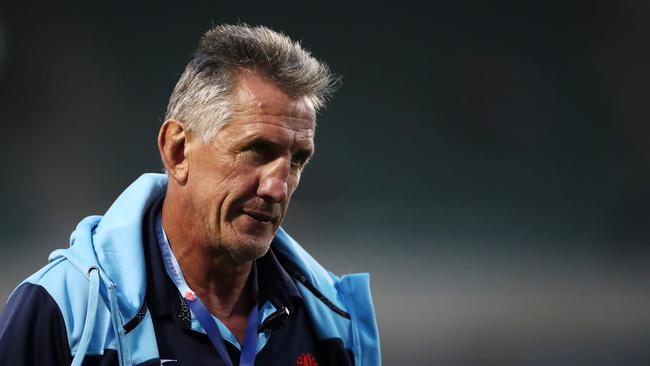
“We can open the door to pick up a little package of food that arrives three times a day.
“So spending a lot of time in front of the laptop to regurgitating and searching and it's been an opportunity to put a lot of solitary thinking into some things and a lot of zoom meetings with staff and support people at the Waratahs.
“I'm on my own. I travelled on my own. I wouldn't want to the family through this, particularly my wife. We're outdoorsy people so this wouldn't have been good for her.
“My glass is always half full so, for me, I'm just embracing it, doing what needs to be done.
“I can see if you let it get on top of you, it could be really challenging.
“I'm referring to my room as my cell – 1818 – and there's a lot of great people throughout history who have spent unwarranted time in cells.
“So I'm trying to be as productive as I can and be as optimistic as I can and when you look out the window to see what I've got to look forward to, there's a lot of people in worse situations so I would never certainly moan about it.”

Penney outlined exactly what happens to foreign travellers entering Australia’s borders under the coronavirus response laws.
“I booked the ticket, which is quite interesting because you can book the ticket to come back to Australia and it doesn’t say what sort of visas you need,” Penney said.
“So I pulled up at the airport with my tickets and the people at Air New Zealand had to ring through to immigration in Australia to double check I could get access in, and initially I was rejected.
“I pleaded my case, he rung them back and they went through some documentation and I was able to get on.
“It was a frightening half an hour while I waited to see if I was going to be confirmed on the flight.

“There were 60 of us [from New Zealand] coming back to Australia, we were asked to stay on the plane, read out some stipulations, made sure we distanced one-and-a-half metres when we walked off the plane.
“We got given a face mask, we were initially tested with a thing in your ear to get your temperature then we were sent to immigration.
“Got our bags, went through customs, then had to go through a channel with a lot of police and army, which would have been intimidating for some, I guess.
“Then there were half a dozen buses lined up there, I was one of the earlier ones out. The army boys loaded the bags, we got on the bus, we didn’t have any idea where were headed to, even the bus driver didn’t know until we got on.
“Then we arrived at the hotel, they took people in twos and threes of the bus, the army boys unloaded the bus, took the bags into the lobby and we went through a booking-in process which included getting your personal details, next of kin if they needed to contact them in an emergency, and go through and have a debrief with police.
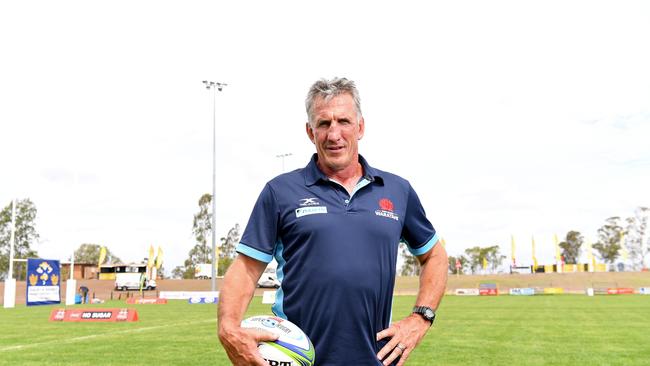
“We went through a whole process of personal details, then we were able to collect our bags, we were taken up the elevator one at a time, met with a person on the floor, they ushered you to your room, and that was four days ago now.
“I’m here til next Saturday (May 30), 14 days, 10 o’clock we get out of jail.”
Penney has spent his first four days bingeing the Netflix sporting documentary that has captured the world’s attention.
“I’ve been engrossed in The Last Dance documentary, it is outstanding,” he said. “That’s got me through the first four days.
“And I’m in the middle of watching some very interesting early days State of Origin documentaries, so bits and pieces, it’s just trying to keep the creative juices flowing and searching for different ideas.”
France, US, Japan! Wallabies spreading far and wide
By Jamie Pandaram
Nervous Wallabies stars are now actively seeking overseas contracts as the uncertainty surrounding Australian rugby’s future raises the prospects of a mass exodus.
Rugby Australia is feverishly working to deliver a broadcast deal for 2021 and beyond that will then allow them to clearly state the financial picture of the game, and confirm what they can pay their players including those already contracted long-term.
But there will be no resolution to this for some weeks, and in that time, more players are likely to lose faith that they will be paid the full terms of their deals.
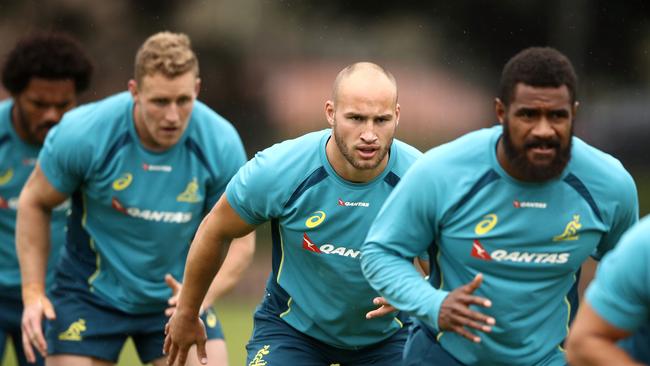
The three Queensland Reds players who this week were stood down without pay for refusing to accept pay cuts – Izack Rodda, Isaac Lucas and Harry Hockings – are set to be the tip of the iceberg, with other players set to take action to get out of their existing contracts.
Off-contract Melbourne Rebels stars Bill Meakes, Angus Cottrell, Anaru Rangi, Ryan Louwrens and Andrew Kellaway are all set to accept overseas deals in Japan and the United States.
Incoming Wallabies coach Dave Rennie has been in regular contact with his top players, but by next year he may be forced to pick from overseas to field a competitive Test side.
It is inevitable that whatever broadcast deal RA gets will be far less than the $57 million-a-year they receive now from the five-year deal signed in 2015.
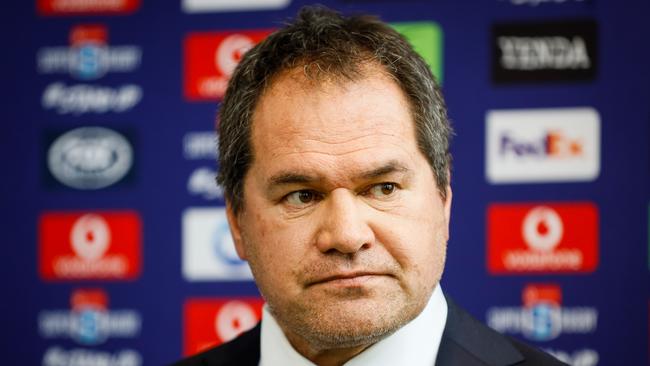
So there will be far less to pay players, and teams will run lean operations.
There are several options for what rugby looks like next year being discussed simultaneously, with SANZAAR holding talks earlier this week and scheduling many more for the coming two months.
Super Rugby as it exists now is dead, but what replaces it is anyone’s guess.
A trans-Tasman tournament between Australia and New Zealand is one option, while another is a domestic competition with the existing four franchises and the potential reintegration of the Western Force who were axed in 2017.
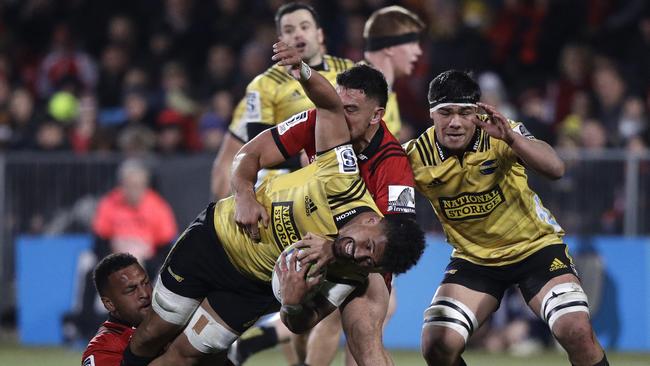
It’s all contingent on what a broadcaster is willing to pay, and RA must determine which model can deliver a sustainable outcome for years to come by July.
They’re also beholden to the decision of New Zealand, who had a five-year broadcast deal signed late last year, but are now negotiating with Sky regarding the terms of the agreement, given the 14-team round-robin tournament involving South African teams and Argentina’s Jaguares is no chance of going ahead due to the COVID-19 pandemic, associated loss of revenue and uncertain border restrictions.
The Kiwis are also discussing a domestic-only tournament from next year. If they decide to go that way, the trans-Tasman idea will be buried and Australia will have no choice but to also stage a local tournament, and hope it lures enough broadcast money to retain some of the best Wallaby players.
Originally published as Wallabies stars looking for exit off Rugby Australia’s sinking ship

